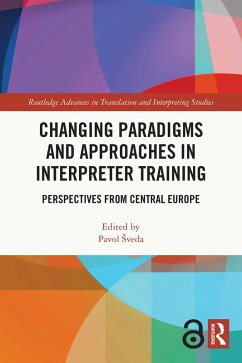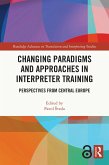Changing Paradigms and Approaches in Interpreter Training (eBook, PDF)
Perspectives from Central Europe
Redaktion: Sveda, Pavol
40,95 €
40,95 €
inkl. MwSt.
Sofort per Download lieferbar

20 °P sammeln
40,95 €
Als Download kaufen

40,95 €
inkl. MwSt.
Sofort per Download lieferbar

20 °P sammeln
Jetzt verschenken
Alle Infos zum eBook verschenken
40,95 €
inkl. MwSt.
Sofort per Download lieferbar
Alle Infos zum eBook verschenken

20 °P sammeln
Changing Paradigms and Approaches in Interpreter Training (eBook, PDF)
Perspectives from Central Europe
Redaktion: Sveda, Pavol
- Format: PDF
- Merkliste
- Auf die Merkliste
- Bewerten Bewerten
- Teilen
- Produkt teilen
- Produkterinnerung
- Produkterinnerung

Bitte loggen Sie sich zunächst in Ihr Kundenkonto ein oder registrieren Sie sich bei
bücher.de, um das eBook-Abo tolino select nutzen zu können.
Hier können Sie sich einloggen
Hier können Sie sich einloggen
Sie sind bereits eingeloggt. Klicken Sie auf 2. tolino select Abo, um fortzufahren.

Bitte loggen Sie sich zunächst in Ihr Kundenkonto ein oder registrieren Sie sich bei bücher.de, um das eBook-Abo tolino select nutzen zu können.
This collection offers a unified treatment of the latest research on interpreter training in Central Europe with a special focus on community interpreting. This book will be of interest to students and scholars in interpreting studies, as well as active interpreter trainers and program coordinators.
- Geräte: PC
- ohne Kopierschutz
- eBook Hilfe
- Größe: 2.33MB
Andere Kunden interessierten sich auch für
![Changing Paradigms and Approaches in Interpreter Training (eBook, ePUB) Changing Paradigms and Approaches in Interpreter Training (eBook, ePUB)]() Changing Paradigms and Approaches in Interpreter Training (eBook, ePUB)40,95 €
Changing Paradigms and Approaches in Interpreter Training (eBook, ePUB)40,95 €![Qualitative Research Topics in Language Teacher Education (eBook, PDF) Qualitative Research Topics in Language Teacher Education (eBook, PDF)]() Qualitative Research Topics in Language Teacher Education (eBook, PDF)42,95 €
Qualitative Research Topics in Language Teacher Education (eBook, PDF)42,95 €![Researching Interpretive Talk Around Literary Narrative Texts (eBook, PDF) Researching Interpretive Talk Around Literary Narrative Texts (eBook, PDF)]() John GordonResearching Interpretive Talk Around Literary Narrative Texts (eBook, PDF)44,95 €
John GordonResearching Interpretive Talk Around Literary Narrative Texts (eBook, PDF)44,95 €![EFL Pedagogy as Cultural Discourse (eBook, PDF) EFL Pedagogy as Cultural Discourse (eBook, PDF)]() Muzna Awayed-BisharaEFL Pedagogy as Cultural Discourse (eBook, PDF)40,95 €
Muzna Awayed-BisharaEFL Pedagogy as Cultural Discourse (eBook, PDF)40,95 €![Four Dichotomies in Spanish: Adjective Position, Adjectival Clauses, Ser/Estar, and Preterite/Imperfect (eBook, PDF) Four Dichotomies in Spanish: Adjective Position, Adjectival Clauses, Ser/Estar, and Preterite/Imperfect (eBook, PDF)]() Luis H. GonzálezFour Dichotomies in Spanish: Adjective Position, Adjectival Clauses, Ser/Estar, and Preterite/Imperfect (eBook, PDF)21,95 €
Luis H. GonzálezFour Dichotomies in Spanish: Adjective Position, Adjectival Clauses, Ser/Estar, and Preterite/Imperfect (eBook, PDF)21,95 €![Language Use in English-Medium Instruction at University (eBook, PDF) Language Use in English-Medium Instruction at University (eBook, PDF)]() Language Use in English-Medium Instruction at University (eBook, PDF)41,95 €
Language Use in English-Medium Instruction at University (eBook, PDF)41,95 €![The Languages of the World (eBook, PDF) The Languages of the World (eBook, PDF)]() Kenneth KatznerThe Languages of the World (eBook, PDF)57,95 €
Kenneth KatznerThe Languages of the World (eBook, PDF)57,95 €-
-
-
This collection offers a unified treatment of the latest research on interpreter training in Central Europe with a special focus on community interpreting. This book will be of interest to students and scholars in interpreting studies, as well as active interpreter trainers and program coordinators.
Dieser Download kann aus rechtlichen Gründen nur mit Rechnungsadresse in A, B, BG, CY, CZ, D, DK, EW, E, FIN, F, GR, HR, H, IRL, I, LT, L, LR, M, NL, PL, P, R, S, SLO, SK ausgeliefert werden.
Produktdetails
- Produktdetails
- Verlag: Taylor & Francis eBooks
- Seitenzahl: 280
- Erscheinungstermin: 26. Mai 2021
- Englisch
- ISBN-13: 9781000389241
- Artikelnr.: 61429664
- Verlag: Taylor & Francis eBooks
- Seitenzahl: 280
- Erscheinungstermin: 26. Mai 2021
- Englisch
- ISBN-13: 9781000389241
- Artikelnr.: 61429664
- Herstellerkennzeichnung Die Herstellerinformationen sind derzeit nicht verfügbar.
Pavol veda teaches interpreting studies at the Faculty of Arts, Comenius University in Bratislava, Slovakia. Combining an active interpreting career with the training of future interpreters, his research concerns the pedagogy of interpreter training, curriculum design, and the sociological aspects of translation and interpreting.
Contents
List of Contributors
Introduction
1. Introducing interpreter training in Central Europe
Part I.: Interpreter training programmes in continuous evolution
2. Public service interpreting in the context of social and political
tensions
3. Pathways in interpreter training: an Austrian perspective
4. Sign-language interpreting and community interpreting - collaboration
and mutual gains
5. Towards a common blended learning model for conference and public
service interpreting: A case study
6. The evolution of interpreter training in Hungary: from consecutive to
conference and legal interpreting
7. New training methods and education formats in interpreter training at
the Institute of Translation Studies, Faculty of Arts, Charles
University, Prague, Czech Republic
8. Designing curricula from scratch: how countries in Central Europe
with no tradition of formal PSIT training provide interpreting in the
public sector
9. From conference to community interpreter education: The
transformation of interpreter education in Slovenia
Part II.: Motivating students of interpreting
10. Motivational structure and the interpreter's personality
11. Interpreter trainees' performance - motivation, quality and
assessment (an empirical study)
12. Self-reflection tools in interpreter training: a case study involving
learners' diaries
13. Interpreter training in Central Europe: looking back and ahead
Index
List of Contributors
Introduction
1. Introducing interpreter training in Central Europe
Part I.: Interpreter training programmes in continuous evolution
2. Public service interpreting in the context of social and political
tensions
3. Pathways in interpreter training: an Austrian perspective
4. Sign-language interpreting and community interpreting - collaboration
and mutual gains
5. Towards a common blended learning model for conference and public
service interpreting: A case study
6. The evolution of interpreter training in Hungary: from consecutive to
conference and legal interpreting
7. New training methods and education formats in interpreter training at
the Institute of Translation Studies, Faculty of Arts, Charles
University, Prague, Czech Republic
8. Designing curricula from scratch: how countries in Central Europe
with no tradition of formal PSIT training provide interpreting in the
public sector
9. From conference to community interpreter education: The
transformation of interpreter education in Slovenia
Part II.: Motivating students of interpreting
10. Motivational structure and the interpreter's personality
11. Interpreter trainees' performance - motivation, quality and
assessment (an empirical study)
12. Self-reflection tools in interpreter training: a case study involving
learners' diaries
13. Interpreter training in Central Europe: looking back and ahead
Index
Contents
List of Contributors
Introduction
1. Introducing interpreter training in Central Europe
Part I.: Interpreter training programmes in continuous evolution
2. Public service interpreting in the context of social and political
tensions
3. Pathways in interpreter training: an Austrian perspective
4. Sign-language interpreting and community interpreting - collaboration
and mutual gains
5. Towards a common blended learning model for conference and public
service interpreting: A case study
6. The evolution of interpreter training in Hungary: from consecutive to
conference and legal interpreting
7. New training methods and education formats in interpreter training at
the Institute of Translation Studies, Faculty of Arts, Charles
University, Prague, Czech Republic
8. Designing curricula from scratch: how countries in Central Europe
with no tradition of formal PSIT training provide interpreting in the
public sector
9. From conference to community interpreter education: The
transformation of interpreter education in Slovenia
Part II.: Motivating students of interpreting
10. Motivational structure and the interpreter's personality
11. Interpreter trainees' performance - motivation, quality and
assessment (an empirical study)
12. Self-reflection tools in interpreter training: a case study involving
learners' diaries
13. Interpreter training in Central Europe: looking back and ahead
Index
List of Contributors
Introduction
1. Introducing interpreter training in Central Europe
Part I.: Interpreter training programmes in continuous evolution
2. Public service interpreting in the context of social and political
tensions
3. Pathways in interpreter training: an Austrian perspective
4. Sign-language interpreting and community interpreting - collaboration
and mutual gains
5. Towards a common blended learning model for conference and public
service interpreting: A case study
6. The evolution of interpreter training in Hungary: from consecutive to
conference and legal interpreting
7. New training methods and education formats in interpreter training at
the Institute of Translation Studies, Faculty of Arts, Charles
University, Prague, Czech Republic
8. Designing curricula from scratch: how countries in Central Europe
with no tradition of formal PSIT training provide interpreting in the
public sector
9. From conference to community interpreter education: The
transformation of interpreter education in Slovenia
Part II.: Motivating students of interpreting
10. Motivational structure and the interpreter's personality
11. Interpreter trainees' performance - motivation, quality and
assessment (an empirical study)
12. Self-reflection tools in interpreter training: a case study involving
learners' diaries
13. Interpreter training in Central Europe: looking back and ahead
Index







